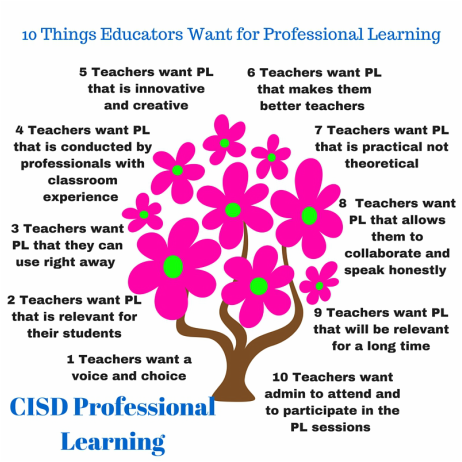A Transformative Approach to Professional Learning
Why Transform Professional Development?The National Staff Development Council states that educators are most effective when they use their minds as active learners and problem solvers. This seems elementary, but some school systems use professional development in ways that discourage rather than encourage educators’ intellectual development. In these school systems, the approach to professional learning is, in effect: “We’ve determined what you need to learn. We’ve determined the best way for you to learn it. We’ve determined how you should use the learning we provide you.” As a result, it is no wonder that some educators have so little investment in their learning, or so little commitment to applying their learning to benefit their students. Therefore, we should not be surprised when educators replicate this same approach to learning in their classrooms (Definition of Professional Development, n.d.).
|
Introduction |
The goal of this plan is to provide a framework for professional learning in Castleberry ISD. The Professional Learning Plan consists of an aligned and integrated approach to enhancing the quality of teaching and learning, developing educators’ professional thinking and practice, and raising student achievement (Definition of Professional Development, n.d.). Educators experience transformative learning when they reflect on assumptions or expectations about what will occur during a lesson, has found these assumptions to be faulty, and revises them so their teaching practice changes to improve learning (Cranton, 1996). Therefore, the traditional term “professional development” at CISD has been changed to “professional learning” to reflect a new emphasis on continuous educator growth and transformation of instructional practice for the purpose of improving student achievement.
|
How will the District Support Professional Learning? |
In the past, professional learning has focused on isolated concepts such as developing content expertise, becoming familiar with certain learner groups, and infusing technology into the classroom, to name a few. However, when educators are not afforded opportunities to collaboratively develop learning activities based on introduced concepts, put them into practice, and reflect on the results and adjustments needed after implementation, professional learning becomes a splintered array of activities designed to increase knowledge and understanding in disconnected fields (Cranton, 1996).
Research indicates that excellent teacher professional learning:
Therefore, CISD school leaders recognize professional learning as an integral part of school improvement, with professional learning planned and provided systematically according to the needs of educators (Professional Development, 2015). |
References
- Professional Development [PDF]. (2015, November). Cambridge International Examinations.
- Cranton, P. (1996). Professional Development as Transformative Learning. New Perspectives for Teachers of Adults. The Jossey-Bass Higher and Adult Education Series. Jossey-Bass Publishers, Inc., 350 Sansome Street, San Francisco, CA 94104.
- Definition of Professional Development. (n.d.). Retrieved March 19, 2016, from http://learningforward.org/who-we-are/professional-learning-definition#.Vu2yeeIrLIU
